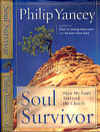 |
 As these bio pages are constructed over the course, the pictures will outline
in blue and become active links. Individual pages will be built up with
deeper research in the manner of the 75 Spiritual Innovators study.Meanwhile here are some representive quotes for each. As these bio pages are constructed over the course, the pictures will outline
in blue and become active links. Individual pages will be built up with
deeper research in the manner of the 75 Spiritual Innovators study.Meanwhile here are some representive quotes for each. |
 |
Phillip Yancey This present book is his own spiritual biography. "I felt drawn to
writing because for me it had opened chicks of light that became a window
to another world. ... I have clung fiercely to the stance of a pilgrim,
for that is all I am." (p 7) "I decided ... to scout out people
I could learn from... The people in this book are select representatives
of those I have learned from and am challenged by." (p 8-9) "Christians
are not perfect, by any means, but they can be people made fully alive.
This is what they look like." (p 10) |
 |
Martin Luther King Jr. "In the end, it was not King's humanitarianism that got throught
to me, nor his Gandhian example of nonviolent resistance, nor his personal
sacrifices, inspiring as those may be. It was his grounding in the Christian
gospel that finally made me conscious of the beam in my eye and forced
me to attend to the message he was proclaiming. Because he kept quoting
Jesus, eventually I had to listen. The church may not always get it right
- but when it does, God's own love and forgiveness flow down like a stream
of living water." (p40) |
 |
Dr. Paul Brand "Because of where I practiced medicine, I never made much money at
it. But I tell you that as I look back over a lifetime of surgery, the
host of friends who once were patients bring me more joy than wealth could
ever bring. I first met them when they were suffering and afraid. As their
doctor, I shared their pain. Now that I am old, it is their love and gratitude
that illuminates the continuing pathway of my life. It's strange - those
of us who involve ourselves in places where there is the most suffering,
look back in surprise to find that it was there that we discovered the
reality of joy." (p85) |
 |
GK Chesterton "Chesterton himself said that the modern age is characterized by
a sadness that calls for a new kind of prophet, not like prophets of old
who reminded people that they were going to die, but someone who would
remind them they are not dead yet. The prophet of ample girth and ample
mirth filled that role splendidly. T.S. Eliot judged that "He did
more, I think, than any man of his time ... to maintain the existence of
the important minority in the modern world." I know that for me. Whenever
I feel my faith going dry again, I wander to a shelf and pick up a book
by G.K. Chesterton. The adventure begins all over again." (p 59) |
 |
Leo Tolstoy and Feodor Dostoevsky "My deepest doubts about the faith can be summed up in a single question:
Why doesn't it work? ... I have never met a serious follower of any religion
who lacks appreciation for Jesus, but what about the church?" (p 119)
"New Testament passages, most notably the Sermon on the Mount, spell
out lofty ethical ideals. ... I have felt a constant, unresolvable tension
over Christian failures." ... I found no way to address the cognitive
dissonance that kept me in a state of spiritual restlessness until I came
upon the writings of two nineteenth-centruy Russian novelists. My understanding
of the tension between Christian ideals and reality now consists of part
Tolstoy and part Dostoevsky." (p 121) "I claim these two Russians
as my spiritual guides because they help answer my underlying doubts by
throwing light on a central paradox of the Christian life. ... Tolstoy
got it halfway right: anything that makes me feel comfort with God's moral
standard, anything that makes me feel, "At last I have arrived,"
is a cruel deception. Dostoevsky got the other half right: anything that
makes me feel discomfort with God's forgiving love is also a cruel deception."
(p 144) |
 |
 |
Dr. Robert Coles " What Robert Coles has been talking about all these years is the
inherent dignity of human beings, the image of God that lives in all of
us, black or white, educated or illiterate, rich or poor, healthy or sick
- the spark that makes mortals immortal. He did not start out believing
it. But it was what the children told him, and then the novelists, and
then his own research confirmed it. And it is what he is trying to tell
the rest of us now." )p 116) |
 |
Dr. C. Everett Koop "The gospel presents both high ideals and all-encompassing grace.
Very often, however, the church tilts one direction or the other. Either
it lowers the ideals, adjusting moral standards downward, softening Jesus'
strong commands, rationalizing behavior; or else it pulls in the boundaries
of grace, declaring some sins worse than others, some sinners beyond the
pale. Few churches stay faithful gboth to the high ideals of gospel and
its bottomless grace. Dr. C. Everett Koop's life in the spotlight shows
how difficult a balancing act that is. Nevertheless, I am convinced that
unless we embrace both messages we will betray the good news that Jesus
brought to earth." (p 202) |
 |
Mahatma Gandhi "When I read the history of Mahatma Gandhi alongside the history
of the Christian church, I cannot help wondering what went wrong. Why did
it take a Hindu to embrace the principles of reconciliation, humility,
and vicarious sacrifice so clearly modeled by Jesus himself? Gandhi credited
Jesus as his source for these life principles, and he worked like a disciplined
soldier to put them into practice. What has kept Christians from following
Jesus with the same abandon?" (p 162) |
 |
John Donne "I have read many words on the poblem of pain, and written some myself.
Nowhere, however, have I found such a concentrated, wise meditation on
the human condition as in the journal John Donne kept during the weeks
of his illness, as he lay preparing to die. Having braced himself to wrestle
with God, he instead found himself in the arms of a merciful Physician,
who tenderly guided him through the crisis so that he could emerge to give
comfort and hope to others." (p 224) |
 |
Annie Dillard "Dillard sighs, "I would rather, I think, undergo the famous
dark night of the soul than encounter in church the hootenanny." She
adds, "In two thousand years, we have not worked out the kinks. We
positively glorify them. Week after week we witness the same miracle: that
God is so mighty he can stifle his own laughter." She lodges against
the church not the dreary complaint of so many modern writers - its irrelevance
to our age - but rather the opposite: If Christianity is true, why on earth
don't we act like it" "Does anyone have the foggiest idea what
sort of power we so blithely invoke?"" (p 239) |
 |
Frederick Buechner "I nearly despaired of the usefulness of any writing about faith
until I discovered Buechner. It seemed to me at the time that Christians
were reading primarily for the experience ofnodding agreement, "Yes
that's true," whereas great literature makes us stop and ponder: "I've
never imagined it that way before." For Beuchner, faith was an act
of discovery, not a packet of orthodoxy dispensed from on high. He made
me slow down and pay attention, first to the words and then to the thoughts
behind them." (p 270) |
 |
Shusaku Endo "He is presenting a Jesus the Japanese can relate to, and for them
all tokens of power make Jesus intimidating and difficult to accept."
(p 289)... "A novelist cannot write about what is holy," Endo
says, "He cannot depict the holy Christ, but he can write about Jesus
throught the eyes of the sort of people who stepped on the fumie, or the
eyes of his disciples and others who betrayed the Christ." He might
have added that the novelist can only write about Jesus throught the eyes
of the novelist himself, for in the end Endo did not stray far from his
own autobiography." ( p 291) |
 |
Henri Nouwen "As Nouwen points out, "God rejoices. Not because the problems
of the world have been solved, not because all human pain and suffering
have come to an end, nor because thousands of people have been converted
and are now praising him for his goodness. No, God rejoices because one
of his children who was lot has been found." ... I miss Henri Nouwen.
... a single image captures him best: the energetic priest, hair in disarray,
using his restless hands as if to fashion a homily out of thin air, celebrating
an eloquent birthday Eucharist for an unresponsive child-man so damaged
that most parents would have had him aborted. A better symbol of the Incarnation,
I can hardly imagine." (p 316) |
|


